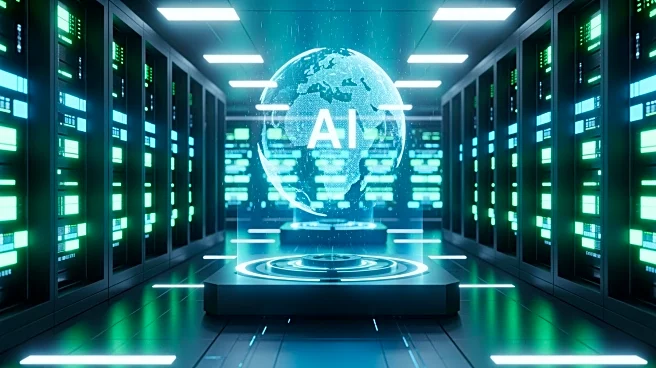What's Happening?
Experts at the Nvidia GTC conference highlighted the significant economic opportunities created by the expansion of data centers and internet-connected technologies. The growth in data center workloads and virtualized computing resources has been substantial,
with a sixfold increase between 2010 and 2018. This expansion is driven by the proliferation of connected devices in U.S. households, which now average 13 device types and 21 connected devices per home. The integration of artificial intelligence (AI) and machine learning in data centers has further increased their workload, with many facilities dedicated to these technologies. Prominent companies like Belden, Lucid Motors, and Foxconn are utilizing Nvidia's Omniverse technologies to enhance AI-powered manufacturing processes. The National Association of Manufacturers (NAM) reports that 51% of manufacturers currently use AI, with 60% planning to adopt it by 2027.
Why It's Important?
The expansion of data centers and AI technologies is reshaping the U.S. manufacturing and construction industries, creating new job opportunities and driving economic growth. The data center market has seen a 50% increase in direct employment from 2017 to 2023, contributing to a total of 4.7 million jobs. The electrical equipment manufacturing sector has invested heavily in this market, spending approximately $185 billion since 2018. This growth is crucial for maintaining the U.S.'s competitive edge in technology and manufacturing. However, it also presents challenges, such as the need for a skilled workforce capable of utilizing these advanced technologies. The demand for manufacturing jobs is expected to reach 3.8 million by 2033, highlighting the importance of reskilling workers to meet the evolving demands of the industry.
What's Next?
The future of the U.S. manufacturing and data center industries will depend on several factors, including tax policy, regulatory modernization, and energy infrastructure development. Industry leaders are calling for legislative action to strengthen the AI market and improve energy infrastructure, as data centers and AI currently consume a significant portion of electricity. Stabilizing the supply chain and ensuring the availability of raw materials and equipment are also critical for continued innovation and growth. The collaboration between manufacturers and data centers is expected to drive further advancements in manufacturing capabilities, particularly in top data center markets.
Beyond the Headlines
The rapid evolution of data centers and AI technologies presents both opportunities and challenges for the U.S. economy. While these advancements offer significant economic benefits, they also raise concerns about energy consumption and environmental impact. The push for permitting reform and streamlined energy projects reflects the need to balance economic growth with sustainability. Additionally, the focus on reskilling the workforce underscores the importance of education and training in preparing workers for the jobs of the future. As the industry continues to evolve, addressing these challenges will be crucial for ensuring long-term economic stability and growth.















